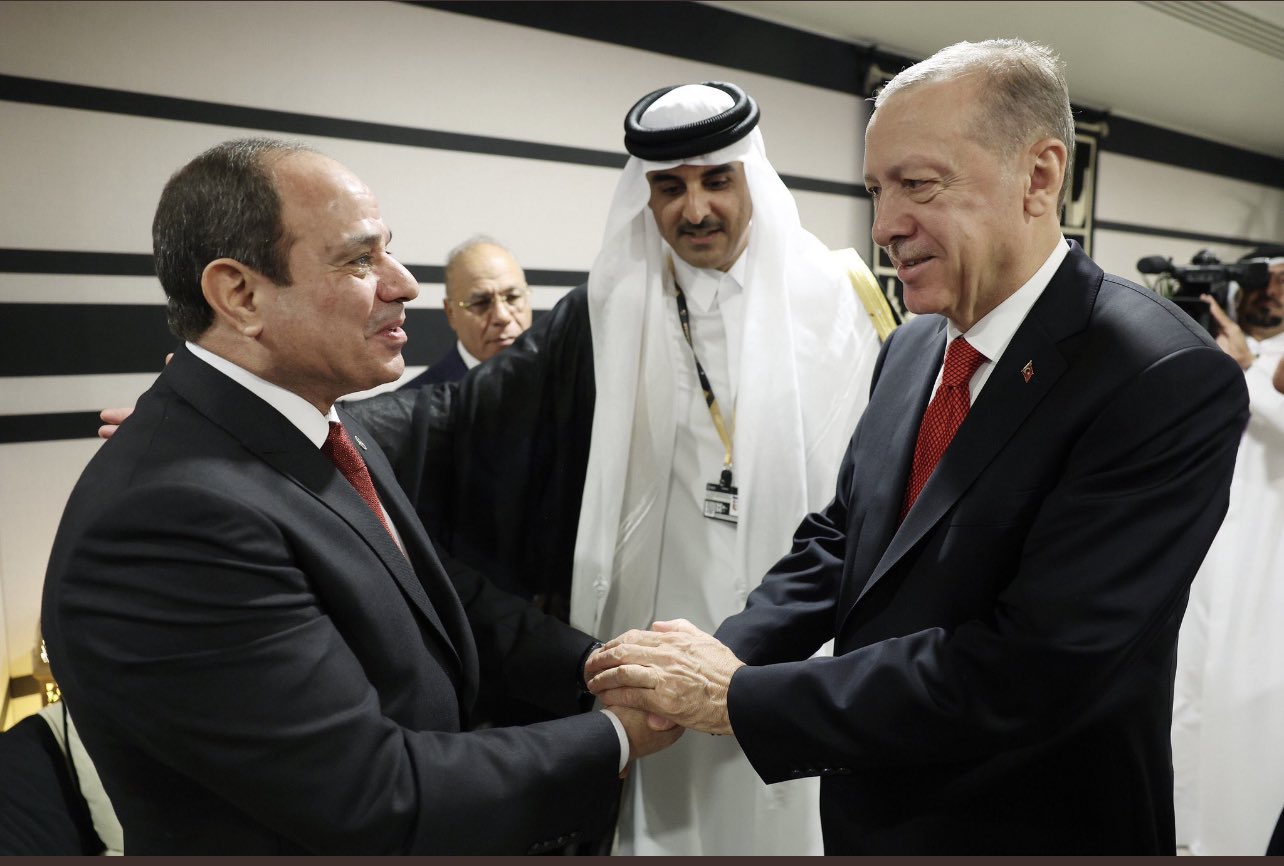Turkey’s President Recep Tayyip Erdogan has grown accustomed to swallowing his pride over the past year, making nice with Arab states like Saudi Arabia and the United Arab Emirates that he has long regarded with open contempt but now needs to bail out his country’s stricken economy. But his decision to kiss and make up with his Egyptian counterpart, General Abdel-Fattah El-Sisi, reflects geopolitical realities more than economic necessity.
Unlike the petrostates, Egypt cannot offer Turkey substantial investment or lines of credit: Cairo itself needs economic assistance from the Gulf Arabs, not least to cover a $16 billion external finding gap. But Sisi, who is close to the Saudi and Emirati rulers, could be useful to Erdogan in maintaining those newly mended relations. The general could also serve as an intermediary with the US, with which Erdogan frequently clashes.
But perhaps the most immediate service Sisi can offer his Turkish counterpart is as a go-between with Greece. Relations between Ankara and Athens have deteriorated to the point where Erdogan now routinely threatens military action. His bellicosity is mostly performative, designed to rouse his base ahead of the general election next summer. But he will need the help of third parties to keep matters from getting out of hand.
Having antagonized Turkey’s NATO allies — mostly recently by blocking Sweden and Finland from joining the alliance — Erdogan could use Sisi’s good relations with the Greeks to keep the rhetorical hostility from turning kinetic. As the Turkish leader put it, “Our expectation from [Egypt] is to establish peace against those being hostile to us in the Mediterranean Sea.”
For Sisi, a chance to mediate Turco-Greek hostilities would represent an affirmation of Egypt’s importance in the Eastern Mediterranean and of his own stature as a regional leader. And any brownie points he earns with Erdogan would be useful for bargaining in other disputes between their countries, notably in Libya.
The two men shook hands at a choreographed encounter in Doha late last month, with Qatar’s emir, Sheikh Tamim bin Hamad Al Thani, beaming in satisfaction. Erdogan has since indicated that a formal meeting with Sisi is on the cards, “after minister-level talks.” No dates have been set, but since the Turkish leader needs some foreign-policy successes to bolster his reelection prospects next summer, look out for a well-staged summit in the spring.
Their grip-and-grin was the culmination of a thaw in relations that began in early last year, when an Erdogan spokesman told Bloomberg News that Ankara was seeking to mend relations with the Arab world, after years of mutual suspicion, mainly over Turkey’s support for the Muslim Brotherhood. The regimes in Egypt and the Gulf Arab states regard the Islamist group as an existential threat. Erdogan, whose Justice and Development Party shares some ideological connective tissue with the Brotherhood, has allowed a number of its leaders to operate from Turkey.
Relations between Ankara and Cairo soured in 2013, when Sisi toppled a Muslim Brotherhood government. By the end of the year, Sisi had expelled the Turkish ambassador and Erdogan had declared the Egyptian ambassador persona non grata. The Turkish leader would go on to label Sisi “an illegitimate tyrant” and swore never to speak with him.
Matters got even worse when Turkey intervened in the civil war in Libya, a country Egypt regards as its bailiwick. In turn, Sisi helped form the East Mediterranean Gas Organization, a Cairo-based alliance to promote cooperation in the extraction of natural gas from waters in which Turkey claims an interest: Ankara was not invited to join the group.
But throughout, both leaders were careful not to let their animosity muck up trade. Turkey was Egypt’s sixth-largest trading partner in 2021: Two-way commerce grew to $5.3 billion from $4.7 billion a year earlier. This is similar to relations between Turkey and Israel: Economic ties remained robust throughout their diplomatic freeze, which ended this summer.
The thaw between Turkey and Egypt is unlikely to bring a substantial economic dividend for either side, and their interests will still clash in key areas. Despite the tenuous truce between the belligerents in Libya, there’s plenty of potential for animus between Ankara and Cairo. Erdogan remains determined to exploit hydrocarbons in Libyan waters, which would be a poke in Sisi’s eye. They are still on opposite sides in the conflict over exploration rights off Cyprus.
And then there is the lingering problem of the Muslim Brotherhood. Although Turkish authorities have reportedly leaned on media outlets run by Egyptian exiles to curtail criticism of the Sisi regime, Erdogan has not ejected them — not least because this would be unpopular with Turkish Islamists.
For now, though, the Turkish leader needs his Egyptian counterpart. More handshakes lie ahead.
By: Bobby Ghosh
Source: Bloomberg



